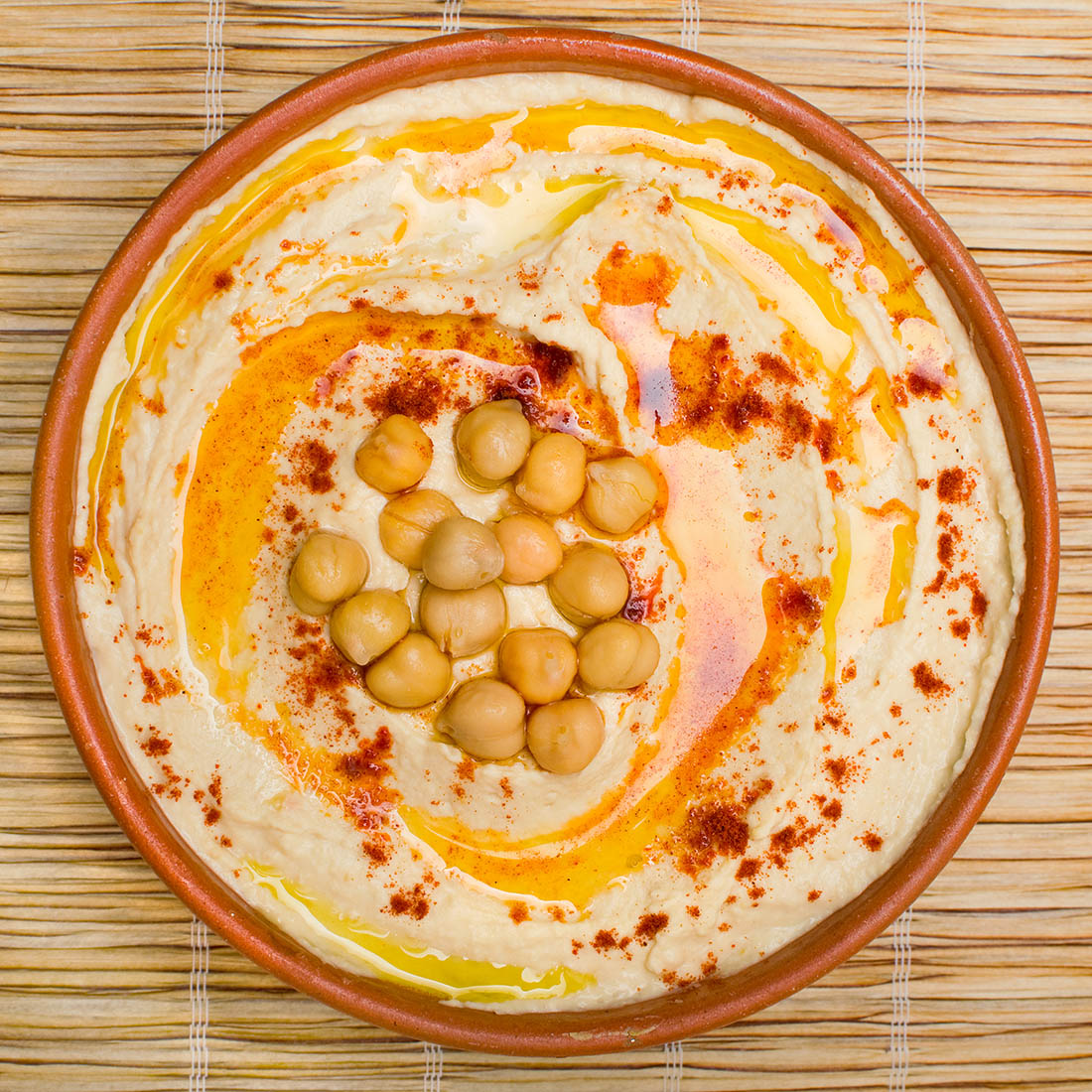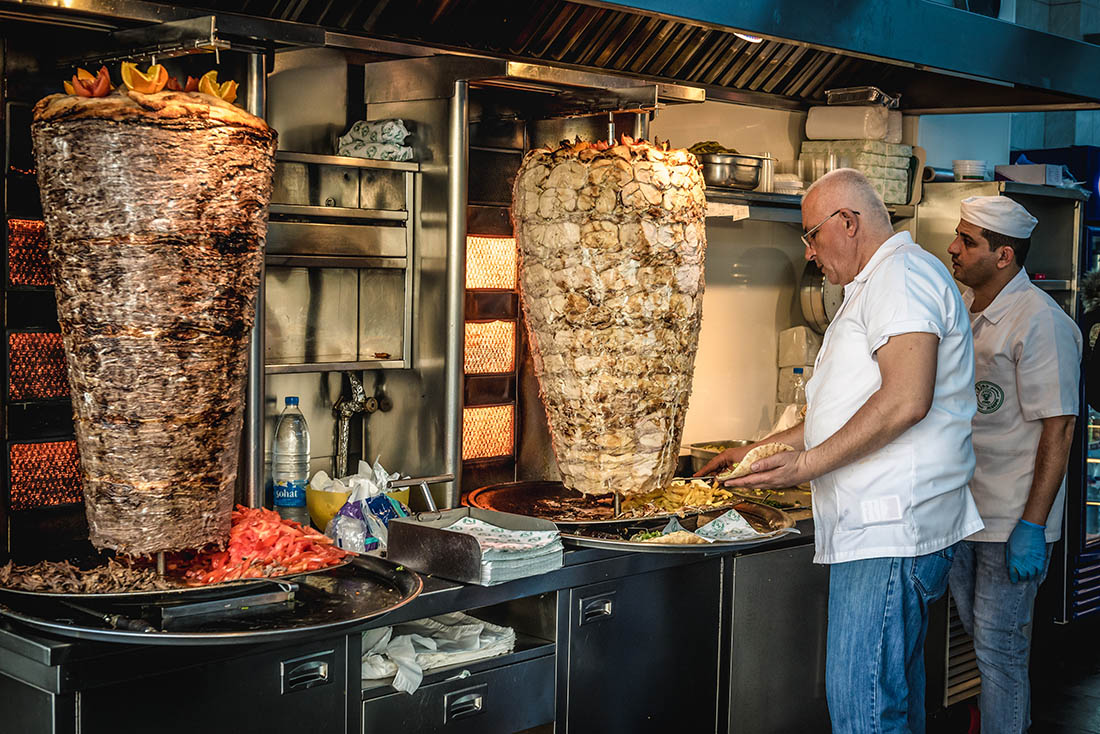In 2021, Canada’s Lebanese diaspora numbered 210,605 people. Lebanese respondents made up Canada’s largest Middle Eastern or Southwest Asian population group. (See also Arab Canadians.) Over the years, Lebanese immigrants have brought Lebanese food, cuisine and products to Canada. They’ve used their cuisine to showcase their culture through grocery stores, restaurants, bakeries and cookbooks. Food was not only a way to build a life in Canada but also a way to keep Lebanese culture alive for future generations.
Lebanese Canadian Restaurants
The first Lebanese immigrants came to Canada in 1882. Lebanese immigration increased during the Lebanese Civil War, which occurred from 1975 to 1990. Many Lebanese people opened restaurants in Canada. Some of these restaurants catered to non-Lebanese demographics while others primarily had Lebanese patrons.
At the time, many Canadians didn’t know what Lebanese food was yet. Lebanese restauranteurs marketed their cuisine as a “healthy” Mediterranean diet. The Mediterranean diet focuses on vegetables and fruit, whole grains, legumes, nuts, seeds, olives, fish, poultry, olive oil and wine. The lifestyle is associated with Italy, Spain, Greece, France and Morocco, but Lebanon as well, as it sits along the Mediterranean Sea. This diet is rooted in what is available locally when it comes to production and agriculture.
For Lebanese immigrants, opening up a restaurant was a way to support themselves in Canada. But it was also a way to share their culture and preserve it while being so far away from home. Culturally, an important part of Lebanese hospitality is food and serving food to visitors at home. As such, restaurants function as an extension of Lebanese hospitality.
In 1975, Alice and Nehme Daou opened one of the first Lebanese restaurants in Canada, Daou Restaurant on Faillon Street East in Montreal. The couple had immigrated to Quebec from Lebanon just two years prior. In Lebanon, Alice had been a seamstress as well as a homemaker to their four daughters, while Nehme worked in construction.
In the aftermath of the 2019 economic crisis and the 2020 Beirut port explosion, emigration out of Lebanon intensified. Between 2018 and 2021, it is estimated that 195,433 people left the country. As a result, we are seeing more Lebanese restaurateurs overseas. Many push the boundaries of how Lebanese food is perceived by the non-Arab world.
Previously, many people’s knowledge of Lebanese cuisine was limited to shawarma, falafel and hummus. (See Popular Lebanese Dishes in Canada.) By 2025, there were more casual restaurants that showcased homecooked food as opposed to fast food. For instance, in Western Canada, Mazahr Lebanese Kitchen and Wild Thyme both serve traditional Lebanese cuisine with dishes similar to what would be found in a Beirut home.
Lebanese fine dining restaurants are also making names for themselves across Canada, especially in Eastern Canada. Notable restaurants include Laylak Lebanese Cuisine, Amal, and Byblos Downtown.
Chain restaurants are also entering the Lebanese cuisine scene in Canada. In March 2024, Malak Al Tawouk, a famous shish tawouk chain in Lebanon, opened their first Canadian location in Montreal. While Zaatar w zeit, an iconic urbanized fast casual chain, opened its first Canadian location in 2018 in Vancouver.
Lebanese Grocers in Canada
Lebanese grocery stores are a saving grace to the homesick Lebanese diaspora seeking the flavours and scents of home. Across the country, stores stock anything from produce, baked goods and pastries to meat and pickled products. Newcomers and international students particularly benefit from these establishments if they have not gone home in a while. It is a custom in the Lebanese diaspora to pack your suitcase with spices or olive oil before leaving Lebanon.
Notably, Adonis Mediterranean Market is one of Quebec’s most iconic Lebanese grocers, if not in all of Eastern Canada. In 1978, the Cheaib brothers, Elie and Jamil, as well as their friend Georges Ghrayeb, got together to create the first store. They acquired their first location on Faillon Street, at the corner of Lajeunesse Street in Montreal. It started as a small store specializing in imported Lebanese and regional products. These included fruits and vegetables, baked goods, pastries and meats. In Lebanon, the Cheaib family operated a farm that grew bananas, oranges and onions; as such, they were not new to the food market or business. In October 2011, the original owners of Adonis signed a partnership contract with Metro. In 2013, with 5 stores in Quebec, Adonis expanded to Ontario .
Another notable example is Arz Fine Foods in the Greater Toronto Area. In 1989, Lebanese Armenian brothers Armand and Hovic Boyadjian founded Arz Fine Foods. For 25 years, Arz Fine Foods was a family-owned and -operated Lebanese grocer that sold an array of prepared, frozen and fresh food from Lebanon and the region. They notably sold olives and olive oil, which are staples in the kitchen. Co-founder Armand notably travels to Lebanon annually for the olive harvest. In 2014, Loblaw purchased Arz Fine Foods.
Lebanese Pita Bread and Bakeries in Canada
Pita bread is a staple in the Middle East. It’s often eaten with every meal, whether that is breakfast with labneh, lunch with shawarma or dinner with falafel. (See also Popular Lebanese Dishes in Canada.) It is a puffed-up bread with a pocket in the middle and is made with simple ingredients like water, dry active yeast, all-purpose flour and sugar. It is even eaten with rice or French fries. Lebanese immigrants have been at the forefront of bringing pita bread to Canada.
Some early examples of Lebanese bakeries making pita include Hanna’s Bakery, which opened in 1968. Through it, Gebran Amine Hanna introduced Eastern Ontario and Western Quebec to pita bread. In Alberta, four brothers ― George, Sal, Sleiman and Elias Daklala ― founded Byblos Bakery in Calgary in 1975. The brothers worked 12 to 15 hours a day when they first opened the bakery, which specialized in pita bread. Now, they also offer naans, bagels and tortilla wraps to consumers in Western Canada. In Moncton, New Brunswick , Mike Timani opened Fancy Pokket Bakery as a small family-owned business in 1989. Timani had immigrated to Toronto only around 13 years earlier. What started as a 1,000 sq. ft. bakery is now the largest producer in Atlantic Canada of not only pita bread, but also of bagels, flatbreads and tortilla wraps.
Lebanese Canadian Cookbooks
Many Lebanese Canadians believe that home-cooked Lebanese food is the best kind. However, as in many other cultures, Lebanese recipes are usually passed down orally. Many home cooks do not measure ingredients, relying instead on muscle memory and taste testing. Recipes are passed down through the generations, by seeing the food cooked at home or through WhatsApp voice notes if abroad.
Still, some cookbooks of Lebanese cuisine have appeared. For instance, Canadian Lebanese restaurateur Mary Salloum is the author of two cookbooks: A Taste of Lebanon: Cooking Today the Lebanese Way and A Taste of the Mediterranean: Vegetarian Style. She is the founder of Cedars Deli in Calgary, which she created with her children in 1985.

 Share on Facebook
Share on Facebook Share on X
Share on X Share by Email
Share by Email Share on Google Classroom
Share on Google Classroom




